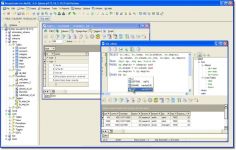 MySQL 5.1.56
MySQL 5.1.56
MySQL AB - (Open Source)
MySQL is a successful open source database used in most web applications, e-commerce and online transaction processing.
MySQL is one of the world's most famous and used open source database. The software can be used to manage web applications, e-commerce and online transaction processing since MySQL database incorporates support those transactions. It is also commonly associated with PHP when it comes to managing websites.
With standard JDBC , ODBC, and Net, the developer can choose the programming language. MySQL has the advantage of working with almost all the popular operating systems and communicate easily with programming languages ​​such as C, C + +, VB, C #, PHP, Python, Ruby, Java, Perl, Eiffel, etc.MySQL replication allows you to create profitable applications. In addition, it enables the development of typologies replication complex and massive chain.Its reliability and robustness, performance, ease of use makes MySQL have more success than anticipated.
- Title:
- MySQL 5.1.56
- File Size:
- 38.9 MB
- Requirements:
- Windows 9x / 2000 / XP / Vista / Windows7 / Windows8
- Language:
- en-us
- License:
- Open Source
- Date Added:
- 07 Mar 2011
- Publisher:
- MySQL AB
- Homepage:
- http://www.mysql.com
- MD5 Checksum:
- DF247A861387C6064ABEA9D1C493EAC4
# Bugs fixed:
* InnoDB Storage Engine: InnoDB returned values for “rows examined†in the query plan that were higher than expected. NULL values were treated in an inconsistent way. The inaccurate statistics could trigger “false positives†in combination with the MAX_JOIN_SIZE setting, because the queries did not really examine as many rows as reported.
* Partitioning: Trying to use the same column more than once in the partitioning key when partitioning a table by KEY caused mysqld to crash. Such duplication of key columns is now expressly disallowed, and fails with an appropriate error.
* Replication: When using the statement-based logging format, INSERT ON DUPLICATE KEY UPDATE and INSERT IGNORE statements affecting transactional tables that did not fail were not written to the binary log if they did not insert any rows. (With statement-based logging, all successful statements should be logged, whether they do or do not cause any rows to be changed.)
* Replication: Formerly, STOP SLAVE stopped the slave I/O thread first and then stopped the slave SQL thread; thus, it was possible for the I/O thread to stop after replicating only part of a transaction which the SQL thread was executing, in wich case—if the transaction could not be rolled back safely—the SQL thread could hang.
Now, STOP SLAVE stops the slave SQL thread first and then stops the I/O thread; this guarantees that the I/O thread can fetch any remaining events in the transaction that the SQL thread is executing, so that the SQL thread can finish the transaction if it cannot be rolled back safely.
* A query of the following form returned an incorrect result, where the values for col_name in the result set were entirely replaced with NULL values:
SELECT DISTINCT col_name ... ORDER BY col_name DESC.
* DELETE or UPDATE statements could fail if they used DATE or DATETIME values with a year, month, or day part of zero.
* The ESCAPE clause for the LIKE operator allows only expressions that evaluate to a constant at execution time, but aggregrate functions were not being rejected.
* Memory leaks detected by Valgrind, some of which could cause incorrect query results, were corrected.
* mysqlslap failed to check for a NULL return from mysql_store_result() and crashed trying to process the result set.
* In debug builds, SUBSTRING_INDEX(FORMAT(...), FORMAT(...)) could cause a server crash.
* When mysqldadmin was run with the --sleep and --count options, it went into an infinite loop executing the specified command.
* Some string manipulating SQL functions use a shared string object intended to contain an immutable empty string. This object was used by the SQL function SUBSTRING_INDEX() to return an empty string when one argument was of the wrong datatype. If the string object was then modified by the SQL function INSERT(), undefined behavior ensued.
* Parsing nested regular expressions could lead to recursion resulting in a stack overflow crash.
* The mysql client went into an infinite loop if the standard input was a directory.
* The expression const1 BETWEEN const2 AND field was optimized incorrectly and produced incorrect results.
* Some RPM installation scripts used a hardcoded value for the data directory, which could result in a failed installation for users who have a nonstandard data directory location. The same was true for other configuration values such as the PID file name.
* On FreeBSD and OpenBSD, the server incorrectly checked the range of the system date, causing legal values to be rejected.
* When using ExtractValue() or UpdateXML(), if the XML to be read contained an incomplete XML comment, MySQL read beyond the end of the XML string when processing, leading to a crash of the server.
Related software
2.1/5 from 178 users


